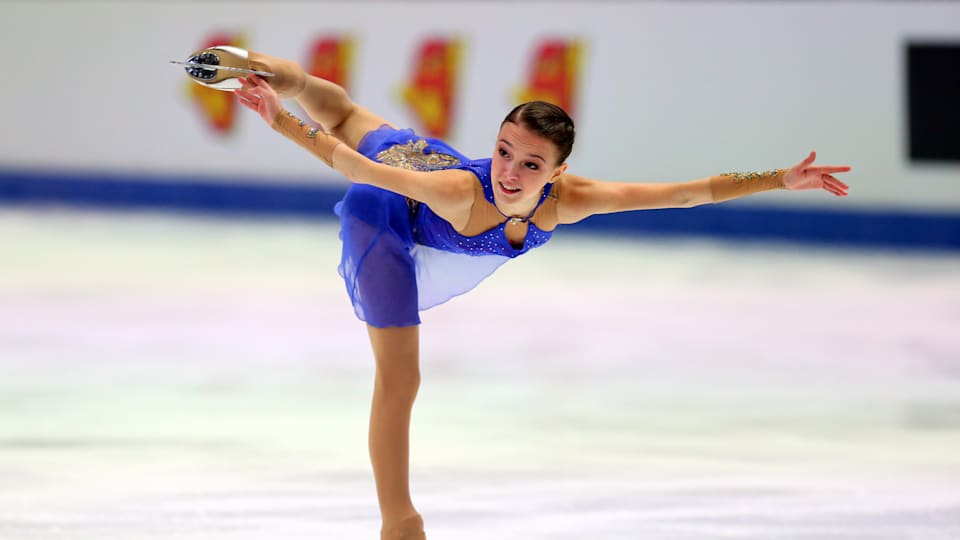
Daria Usacheva (78.41) is the surprise leader of the Figure Skating Cup of Russia third stage in Sochi after the ladies' short program.
The 2020 World Junior Championships silver medallist, who trains under famed coach Eteri Tutberidze in Moscow, put together a clean skate to pip her training-mate Anna Shcherbakova, who has more senior international experience.
Shcherbakova, the reigning national champion and European silver medallist, appeared to be on course to top the standings until a mistake on the last of her three jumping passes, popping a triple loop down to a double rotation.
However, the rest of Shcherbakova's skate was still strong enough to place her second (77.47), ahead of the 2015 world champion Elizaveta Tuktamysheva (76.36).
Meanwhile, Mikhail Kolyada took the men's competition with an overall score of 283.44 points after delivering a near-flawless free skate. The 25-year-old did not compete last season due to reoccurring sinusitis which required surgery in the fall of 2019. He returned to the ice in January and was starting to find his rhythm again when the pandemic hit.
But Kolyada is back.
Usacheva clean; Shcherbakova and Tuktamysheva marked down
Usacheva put in a clean skate for her short program, with nothing particularly eye-catching but no obvious errors either.
The 14-year-old, who is still age-ineligible to compete at senior international competitions, opened her routine with a double Axel. Her second jump, a triple Lutz, was probably the strongest of the three passes she put together, followed closely by the combination triple flip, triple toe loop.
Tuktamysheva, who won both the Worlds and Europeans in 2015, was next on the ice. Although her jumps – a triple Axel, triple Lutz triple toe loop combination, and triple flip – were clean, and she was the only one of the skaters to perform the triple Axel, her program component score for the routine's artistry pulled her overall total down.
Shcherbakova was the last big name to skate, taking to the ice ninth of the ten skaters on the startlist. The 16-year-old's routine, set to Élégie: O doux printemps d'autrefois by French composer Jules Massenet, started strongly with a double Axel followed by a triple flip, and solid spins and step sequences. However, her combination jump let her down, as after a triple Lutz, she could only manage a double loop instead of her planned triple.
Shcherbakova looked disappointed at her error after the skate, looking towards the floor while sitting in the kiss-and-cry.
The free skate takes place on Sunday.
Men's winner: Mikhail Kolyada
Mikhail Kolyada executed an almost perfect free skate to win the men's competition with an overall score of 283.44 points.
17-year-old Andrei Mozalev climbed from third to second place overall, winning the free skate and amassing 274.44 points, he landed three quadruple jumps on the final day.
Dmitry Aliev came in third on 250.71 points having placed second in the short program.
Mikhail Kolyada displayed his gripping combination of power and elegance today, his opening quad toe-triple toe combination drew huge applause from the crowd, following it up with another quad toe.
A small step on a triple Axel towards the end of his routine couldn't erase all the good work that had gone before, and the two-time Russian champion, who has been plagued by a sinusitis problem over the past couple of seasons, enjoyed a sweet victory.
The 25-year-old switched coaches in June from longtime mentor Chebotareva to Alexei Mishin, coach of Olympic champions Alexei Urmanov and Evgeni Plushenko, and the change looks to be paying dividends.
Kolyada looked in sparkling form and physically in great shape, positive signs for the PyeongChang team silver medallist.
Andrei Mozalev wins free skate
Reigning world junior champion and Lausanne 2020 Youth Olympic silver medallist Andrei Mozalev was third after the short program on 90.66 points following a fall on a quad flip but came back stronger today.
The 17-year-old had three quads in his free skate landing the first quadruple flip perfectly but put a hand down for an instant on the subsequent quad toe, but showed what makes him such an exciting talent by getting through the rest of his routine without a wobble.
His triple Lutz-Euler-triple Salchow delivered at speed and with style, and his strength and musicality evolution on the ice plain for all to see.
